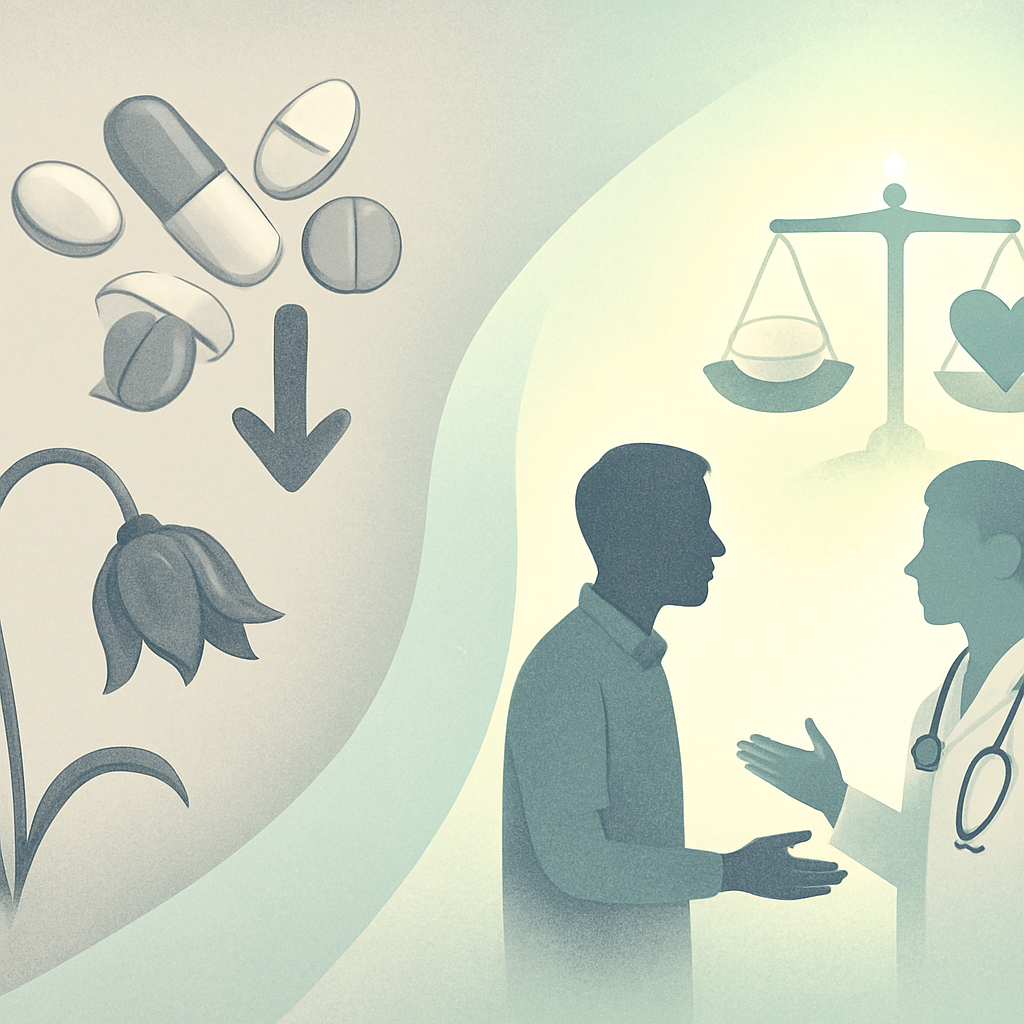When the Cure Affects the Symptoms
Erectile dysfunction (ED) can sometimes be caused not by a health condition itself — but by the medications used to treat it. Many commonly prescribed drugs list ED or reduced sexual function as a side effect, yet most men aren’t warned about the potential impact on their sex life. If you’ve recently started a new medication and noticed changes in your erections, it may not be a coincidence. Understanding which medications are linked to ED — and what you can do about it — is an important step toward restoring both your health and sexual confidence.
How Medications Can Cause ED
Medications can affect erectile function in several ways:
- Reducing blood flow to the penis by narrowing blood vessels
- Altering hormone levels, especially testosterone
- Interfering with nerve signals responsible for arousal
- Impacting brain chemistry, particularly neurotransmitters that regulate libido and pleasure
Sometimes, ED develops gradually as a side effect. Other times, it appears shortly after starting a new medication. Recognizing the pattern is key to identifying the cause.
Common Medications That May Cause ED
1. Blood Pressure Medications
Especially: beta-blockers (atenolol, metoprolol), thiazide diuretics
These drugs reduce blood pressure by lowering heart rate or removing excess fluid. Unfortunately, they can also reduce blood flow to the penis or dull the nervous response needed for arousal. Not all blood pressure meds cause ED — ACE inhibitors and calcium channel blockers have fewer sexual side effects.
2. Antidepressants and Anti-Anxiety Drugs
Especially: SSRIs (sertraline, fluoxetine), SNRIs, tricyclics
These medications affect serotonin and dopamine levels — crucial neurotransmitters for mood, but also for sexual desire and function. Side effects may include reduced libido, delayed ejaculation, or difficulty achieving an erection.
3. Antipsychotics
Used for schizophrenia, bipolar disorder, and severe depression
These medications can reduce dopamine activity and sometimes elevate prolactin, a hormone that suppresses libido and erectile response.
4. Hormonal Medications
Certain drugs used to treat prostate cancer or hormonal imbalances can lower testosterone directly. Others, like corticosteroids, can suppress hormone production with long-term use.
5. Chemotherapy and Cancer Treatments
Cancer drugs often affect rapidly dividing cells — including those in reproductive tissues. ED is a common side effect, especially after treatment for prostate, testicular, or colorectal cancers.
6. Opioid Painkillers
Chronic use of opioids (like oxycodone or morphine) reduces testosterone levels and impairs the body’s natural arousal signals, leading to decreased libido and weaker erections.
7. Antihistamines and Allergy Medications
Some over-the-counter medications for allergies or colds (like diphenhydramine) may cause temporary ED due to their sedating effects.
8. Heartburn and GERD Medications
Long-term use of certain acid reducers (PPIs) has been linked to lower magnesium and testosterone levels, potentially impacting sexual function in some men.
Signs That Your Medication Might Be the Cause
- ED symptoms began shortly after starting a new medication
- Symptoms worsened after a dosage increase
- Morning erections have stopped (a sign the issue may not be purely psychological)
- Other sexual side effects are present, like low libido or delayed orgasm
- No major changes in lifestyle or stress levels occurred to explain the ED
What You Can Do About It
1. Talk to Your Doctor
Never stop a prescribed medication without medical guidance. Instead, have an honest conversation with your doctor. Ask:
- Could this medication be affecting my erections?
- Are there alternatives with fewer sexual side effects?
- Can the dosage be adjusted to reduce the impact?
Your doctor may recommend switching to a different class of medication that achieves the same therapeutic effect without disrupting sexual function.
2. Monitor and Document Symptoms
Keep a journal noting when ED symptoms occur, what medications you’re taking, and any other health changes. This helps your provider identify patterns and pinpoint the likely cause.
3. Support Your Body With Lifestyle Changes
While you may not be able to change certain medications, you can reduce their impact by improving your overall health:
- Exercise regularly to improve blood flow and hormone balance
- Eat a diet rich in vegetables, healthy fats, and lean protein
- Get 7–9 hours of quality sleep
- Reduce stress through mindfulness or therapy
These habits help offset the negative side effects and improve sexual function naturally.
4. Consider ED Medications
If your medication is necessary for your health but causes ED, your doctor may prescribe sildenafil (Viagra) or tadalafil (Cialis) to counteract the effects. These drugs are generally safe to use under medical supervision and can improve blood flow and erection quality.
5. Don’t Ignore the Emotional Impact
Experiencing ED as a side effect can be frustrating and demoralizing. It may also create relationship tension or performance anxiety. Consider working with a therapist or counselor to address the emotional toll and rebuild sexual confidence.
When Sexual Side Effects Are Worth It
Sometimes, a medication’s benefits outweigh its drawbacks. For example, a drug that stabilizes mood, prevents seizures, or controls blood pressure may be essential. In those cases, finding workarounds and supporting sexual health in other ways becomes the goal — not abandoning the treatment entirely. Balance is key.
Final Thought: Knowledge Is Power
Many men suffer in silence, unaware that their medications could be the source of their ED. By becoming informed and proactive, you can work with your healthcare provider to find a solution that treats your condition without sacrificing your sex life. Your health — physical, emotional, and sexual — deserves full support.
